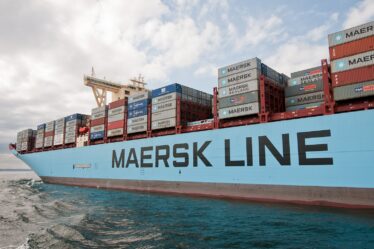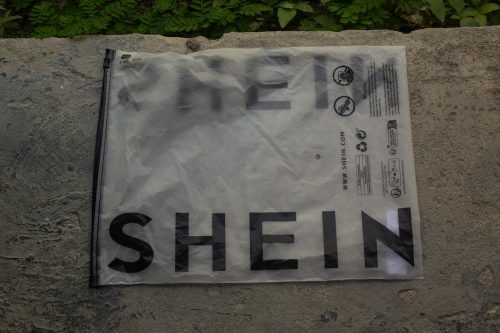
If you have a TikTok account, there’s a very good chance you’ve seen fashion and shopping influencers posting their hauls from Chinese e-commerce giant Shein. But even if you’re not active on social media, the company name probably rings a bell due to the negative rumors surrounding a recent press trip Shein held.
The company has long been under fire for alleged inhumane and unethical working conditions, but when U.S. influencers were invited to tour one of Shein’s factories in China, they took to their accounts to paint a rosy picture of happy employees and “chill” working conditions. So which side of the story is real? To get some answers, we consulted fashion and retail experts who have a deeper knowledge of Shein. Read on to learn about all the negative rumors.
READ THIS NEXT: 5 Red Flags About Shopping on Temu, According to Retail Experts.
Shein is an inexpensive Chinese digital clothing brand that was founded in Nanjing, China in 2008 by entrepreneur Chris Xu. Now based in Singapore, it is one of the world’s most valuable private companies, according to the Wall Street Journal, with a current $66 billion valuation, down from $100 billion in early 2022.
It was during the pandemic, though, that Shein truly became a global phenomenon, with social media influencers regularly posting their shopping “hauls” and gushing over how many clothing items and accessories they were able to buy for as low as $1.50 or $5 at times.
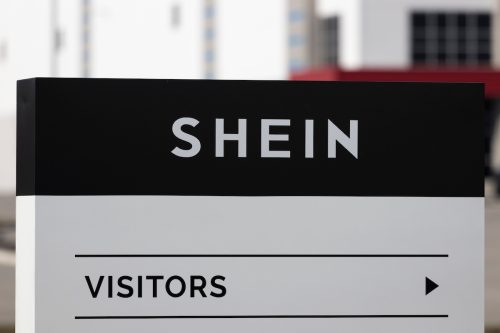
The criticism surrounding Shein has been centered around three main areas: sustainability, tax loopholes, and labor practices, with the final issue garnering the most headlines.
“Recent investigations have raised concerns about the conditions workers are subjected to, including long working hours, low pay, and potential violations of workers’ rights,” Gareth Boyd, a retail entrepreneur and the co-founder and managing director at Boyd Hampers, tells Best Life. “These findings suggest a potential disconnect between Shein’s public declarations about fair pay and the reality within their supply chain.”
Specifically, Shein has been accused of inflicting forced labor on Uyghurs, a marginalized group who primarily lives in China’s Xinjiang region.
Chapin Fay, the executive director of Shut Down Shein, a coalition formed to ensure safe, ethical, and compliant business practices, says that Shein allegedly uses “Uyghur slave labor to pick cotton for products.”
Best Life reached out to Shein, and we will update this story with their response. But in a previous statement to CNBC, a Shein spokesperson said, “As a global company, Shein takes visibility across our entire supply chain seriously. We are committed to respecting human rights and adhering to local laws and regulations in each market we operate in. Our suppliers must adhere to a strict code of conduct that is aligned to the International Labour Organization’s core conventions. We have zero tolerance for forced labor.”
The U.S. banned imports from the Xinjiang Uyghur Autonomous Region (XUAR) in June 2022 due to forced labor concerns. However, in May 2023, U.S. House of Representatives members penned a letter to the Securities and Exchange Commission (SEC) calling for more intense scrutiny of the company.
“While Shein claims its products do not utilize Uyghur forced labor and it works with third parties to audit its facilities, experts counter these types of audits are easily manipulated or falsified by state-sponsored pressure. Other experts argue that it is appropriate to presuppose that any product made in the XUAR is made with forced labor,” the letter said, per CNBC.
Shein also faces criticism for “the exploitation of a U.S. tariff loophole (called de minimis) which says if a package is under $800 USD, it’s not subject to the same tariffs or scrutiny bulk packages go through,” according to Fay.
In response to such claims, a Shein spokesperson told CNBC, “Our policy is to comply with the customs and import laws of the countries in which we operate. Shein continues to make import compliance a priority, including the reporting requirements under U.S. law with respect to de minimis entries.”
And in terms of the company’s impact on the environment, any fast-fashion brand (one that has “rapid and high-volume production,” notes Boyd) is inherently unsustainable.
“While it’s encouraging to see Shein stating they have goals for reducing emissions and waste, consumers should demand more transparency around these initiatives,” Boyd suggests.
On the media section of their website, Shein says, “We know that we have an important role to play in supporting the communities where we work, source, and live, and the planet we all share.” They say to visit sheingroup.com to “learn more about our sustainability + social impact strategy and progress.”
READ THIS NEXT: Communities Are Fighting Back Against Dollar General and Dollar Tree—Here’s Why.
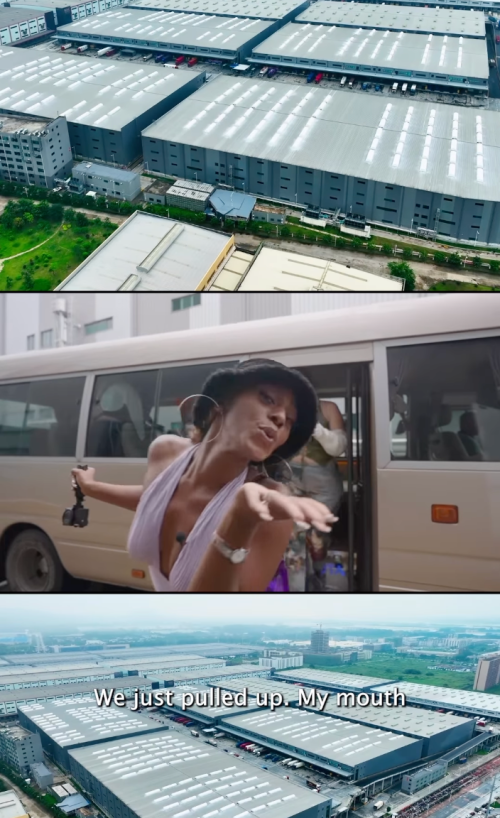
In June 2023, Shein invited a group of American influencers to its “innovation center” in Guangzhou, China. CNN described this as “a bright and spacious facility featuring high-tech fabric cutters and robots that transport materials.”
As such, the influencers—whom Shein refers to as “partners”—all began posting positive accounts of the experience, so glowing, in fact, that some skeptics have even called it “propaganda.”
Influencer, model, and self-described “confidence activist” Dani Carbonari received intense backlash for her now-deleted Instagram video. According to the New York Post, she said she was “impressed to see the working conditions” and that she interviewed a woman in Shein’s fabric-cutting department who said she was “surprised at all of the rumors that have been spread in the U.S.”
“There’s a narrative fed to us in the U.S., and I’m one that always likes to be open-minded and seek the truth, so I’m grateful for that about myself, and I hope the same for you,” Carbonari added.
Likewise, in her Instagram video, lifestyle influencer Destene Sudduth said, “Upon interviewing the workers, a lot of them were confused and taken aback by the child labor questions and the lead in the clothing questions because they basically said, ‘Our kids want to be on social media just like y’all.’ They’re not working in factories and our clothing goes through rigorous testing before production.”
Per NBC News, Sudduth also claimed employees worked from 8 a.m. to 6 p.m. and that they were not “slaving away” as she expected, but rather were “chill” and “not even sweating.”
Carbonari has since released a video explaining her actions, detailing how the visit “didn’t feel like a show” or “quickly put together.” She also said the trip was organized because the company wanted to address negative rumors head-on. While travel and accommodations were taken care of, she was not paid for her posts, she said. However, she did say she “should have done more research.”
In response to claims of “propaganda” and the controversy surrounding the videos, Shein said in a statement to the New York Times, “Their social media videos and commentary are authentic, and we respect and stand by each influencer’s perspective and voice on their experience.”
RELATED:
For more up-to-date information, sign up for our
daily newsletter.
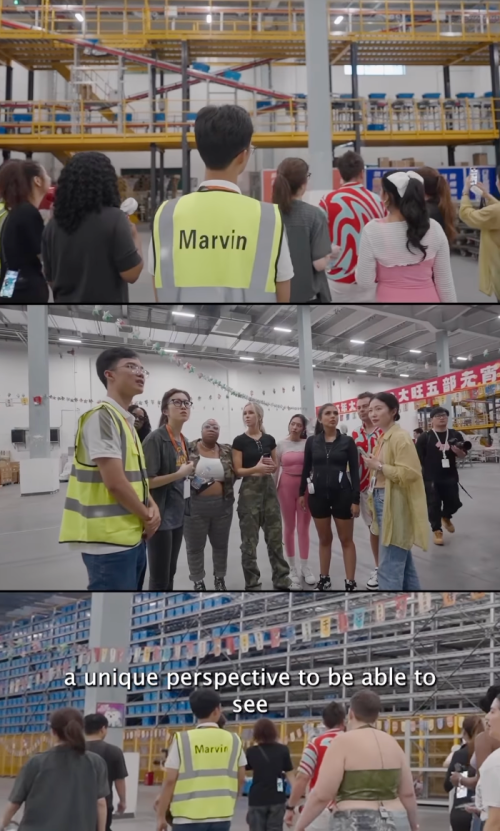
Of course, this isn’t a simple answer, as most people have never visited a Shein factory. But as Boyd notes, this was a “brand-sponsored” trip, meaning Shein had complete control over what influencers saw and how information was conveyed.
To this point, Fay notes, “Shein is also preparing to go public with a possible IPO this year so they are trying to clean up their public image as U.S. lawmakers continue to scrutinize their practices.”
Just yesterday, Reuters reported that Shein “registered with regulators for an initial public offering in New York, people familiar with the matter said.” If true, this could make an IPO possible before the end of 2023.
However, in an email to Reuters, a Shein spokesperson said the company “denies these rumors.” They did not immediately respond to the news outlet’s request for further details, nor did the SEC.
Jeanel Alvarado, retail expert and founder of Retailboss, also points out that there is a difference between a showroom and a factory.
“Many of the Chinese manufacturers have showrooms that house their office for running the business operations side of things. Oftentimes, this may also have seamstresses and workers who only work on making samples, which are small batches or versions of the garments before sending them out to be mass manufactured, and this often happens in an entirely different facility,” she explains.
So, while it is yet to be seen how the U.S. government will handle business operations with the company, “The issues surrounding Shein underscore the importance of transparency and ethical practices in the retail industry,” adds Boyd.



